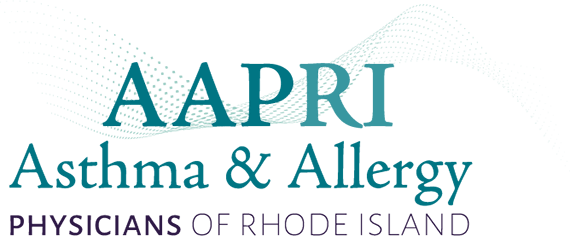Seasonal allergies, like other types of allergies, develop when your body’s immune system overreacts to something in the environment. Summertime, when a wide variety of plants, grasses, and trees are pollinating can be particularly difficult for allergy sufferers. Mold is another common allergy trigger in the Rhode Island area. If you’re in RI or planning to travel, it’s helpful to have information at your fingertips so you can effectively manage your allergies.

Allergy tips
To help you get through the allergy season, we’ve pulled together some useful resources. But first, here are some quick tips to help you avoid exposure to pollen this summer:
- Avoid being outdoors when pollen counts are high.
- If you must go out, wear a snug-fitting face covering (which you should be doing anyway to protect against COVID-19).
- Keep car windows closed and your air conditioning on recirculate.
- Mow your lawn (wearing a face mask if necessary) to prevent grasses from blooming and pollinating.
- Indoors, use a high-efficiency particulate air (HEPA) filter.
- Shower after spending time outdoors to avoid pollens sitting around in mucous membranes.
There’s an app for that!
When it comes to managing your seasonal allergies, let technology be your friend. We’ve put together a list of websites and free apps to help you monitor air quality, pollen counts, and more.
Apps:
- Allergy Alert – Pollen.com’s Allergy Alert provides 5 days of weather and allergy forecasts, as well as an allergy diary so you can track your symptoms. The app allows you to check multiple locations with the swipe of a finger, provides information about top allergens in your area, and much more. This app is free app for iPhone and Android devices.
- Allergy Pollen Count – In addition to pollen and mold counts based on actual air samplings conducted by pollen-certified counters of the National Allergy Bureau, this app also provides continuously updated, educational, allergy-related videos featuring Dr. Safadi, a board-certified allergist. This app is free for iPhone devices.
- My Pollen Forecast – This free app for iPhone shares hay fever forecasts and includes a diary for tracking your symptoms for greater insight. Check out maps of local areas with the highest pollen count and learn about the pollens that affect you the most.
- Plume Air Report – Check the air quality wherever you are with Plume Air Report, free for iPhone and Android devices. This worldwide air quality forecaster provides real-time air quality data and 24-hour forecasts help you plan ahead and keep allergen exposure to a minimum.
- Propeller Health – This FDA-approved technology works with existing asthma and COPD inhalers to help people better understand their symptoms for greater control over their allergies. The app helps you identify triggers and track symptoms, as well as check daily asthma air quality information. Free for iPhone and Android devices.
Websites:
- National Allergy Bureau – This most trusted resource from the American Academy of Allergy, Asthma & Immunology provides accurate pollen and mold levels around the country. You can create an account to get personalized email alerts.
- 15 Day Allergy Forecast – Part of The Weather Channel, this site provides a 15-day forecast to predict the likelihood of allergy symptoms. Simply type in your location by city of Zip Code to see how weather conditions may affect your allergies.
- AccuWeather – AccuWeather provides a 3-day forecast for your specific location, broken down by various types of environmental allergens: ragweed pollen, grass pollen, tree pollen, mold, and dust & dander.
- Pollen.com – This site features a variety of information and tools to help you understand and manage your allergies. You can download the Allergy Alert app and register for a free My Pollen.com account where you can customize your dashboard and keep an allergy diary. Pollen.com also provides weather and pollen counts for your area—or any city in U.S.
- Pollen Library – Pollen Library.com provides a comprehensive listing of all plants and trees that grow in Rhode Island. Broken down by county and by season, this helpful resource provides links to each species so you can learn more about it, and ranks the allergens as significant, moderate, or mild.
Symptom Check: Seasonal Allergies vs. COVID-19
With the spread of the coronavirus (COVID-19) and allergy season in full swing, understanding symptoms can be challenging. Here’s a quick reference list:
| Allergy Symptoms | COVID-19 Symptoms |
| Sneezing | Fever |
| Runny or stuffy nose | Cough |
| Watery and itchy eyes | Shortness of breath |
| Itchy sinuses, throat, or ear canals | Fatigue |
| Ear congestion | Muscle or body aches |
| Postnasal drip | Headache |
| New loss of taste or smell | |
| Sore throat | |
| Congestion or runny nose | |
| Nausea or vomiting | |
| Diarrhea |
Contact your physician to get tested and follow guidelines from the Centers for Disease Control and Prevention about what to do if you suspect you have or have been exposed to COVID-19.

